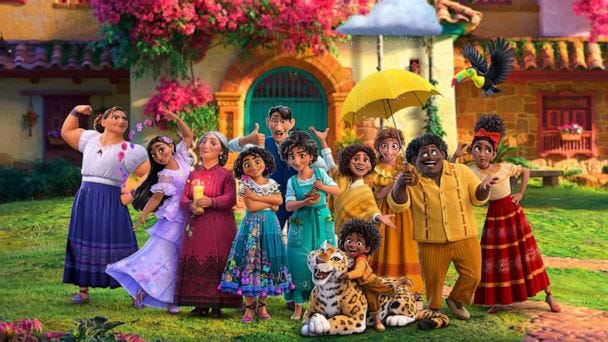Another Take: Encanto
Disney's latest animated outing is full of bright colors and energy, but the songs by Lin-Manuel Miranda are surprisingly flat and the movie's internal logic falters.
Subscribe to Film Yap to support Hoosier critics and be eligible for giveaways and other exclusive opportunities!
I’m about to commit the ultimate heresy for lovers of modern musicals: I thought the songs for “Encanto,” the latest Disney animated adventure, were terribly flat and generic. Not one is tuneful enough to get your toes a-tappin’ while you’re watching it, or echo in your heart afterward.
Only after seeing the movie did I learn the songs are by Lin-Manuel Miranda, the EGOT-chasing wunderkind of Broadway and, more lately, feature films.
I dunno, maybe he had an off day (months?) of composing or I’m tin-eared. Actually, I am tin-eared, aka hearing impaired. But I don’t think hearing these songs better would improve them… possibly the other way.
Honestly, “Encanto” would work better without the songs. All of them are rather egregious examples of the outdated M.O. of characters using a tune to introduce themselves or comment on their own plight. They stop the story rather than carry it along.
Replace every one of the numbers with a dialogue scene, and not only would the movie not be harmed I think it would actually move along a little better.
I know, I know…
(For the record, Junior Yap Critics Cameron and Joel, 8 and 11, give it high marks.)
The story is set in Colombia in a remote village where the family Madrigal lives in a home full of magic — literally. The house itself seems to be sentient, and can move around its pieces to do things like help set the table or even usher people inside. There’s an enchanted candle that never goes out, and upon reaching a certain age every Madrigal child is granted a “gift,” or superpower, by opening their own secret door.
There’s a teen who can shape-shift, another with incredible hearing, an aunt who can control the weather, a tyke who can talk to animals, a mother who can heal any injury or illness by eating the food she makes, and so on.
Kind of… gobsmackingly awesome, if you think about it. Wouldn’t people from all over the world be traveling there to cure their cancer or regrow limbs?
Anyway, the quirky outcast of the family is Mirabel (voice of Stephanie Beatriz), the only kid who didn’t receive a gift. Smart, bespectacled and gutsy, Mirabel soldiers on with the loving support of her parents, Agustín (Wilmer Valderrama) and Julieta (Angie Cepeda), the aforementioned food-healer.
They tell her she’s just as good and valued as everyone else, like her sister, Isabela (Diane Guerrero), who’s beautiful and perfect and spontaneously creates flowers of every hue, or her other sister, Luisa (Jessica Darrow), who’s super-strong and built like a tractor, and is constantly picking up donkeys, moving bridges and other never-ending Herculean labors.
(Emitting blossoms kinda seems like weaksauce compared to being Superchica or having Jesus-level healing powers, but I guess it beats Mirabel’s big ol’ goose-egg.)
However, Mirabel is made to feel less-than by her grandmother, the stern matriarch Abuela (Jessica Darrow), who first established the magical legacy after her husband sacrificed himself to save her and their newborn triplets from invaders. She favors the kids and grandkids who have powers, and tends to see Mirabel as the awkward one who keeps butting in and getting in the way.
Strangely, it’s never acknowledged that Abuela herself has no gift, which you would think make her feel a kinship with Mirabel.
Anyway, cracks start appearing in the façade of the house and Luisa suddenly seems less strong. But when Mirabel tries to warn the family about the magic faltering, it’s dismissed as more of her troublemaking.
But things keep getting worse and Mirabel undertakes the responsibility of fixing things herself, though in the short term her efforts appear disastrous. Her quest thread will lead to Bruno (John Leguizamo), the mysterious and estranged uncle whose ability to foretell the future convinced people that he was actually making bad things happen.
Without getting too spoiler-y, the film’s internal metaphysics and logic — screenplay by Jared Bush and Charise Castro Smith, with Bush also directing with Byron Howard and Smith as co-director — is a bit head-scratching if you think about it for longer than a few seconds. Like, is the candle the center of the magic, or the house? How did Abuela’s husband dying first cast this grand spell? And why exactly is Mirabel denied the precious gift that is the hallmark of the rest of her family?
It all sort of collapses back on tried-and-true tropes, with the bland underpinning of “everyone is special” even when we have differing abilities.
Hey, I’m all for embracing every person as unique, but when it comes to specialness I’m going with Mother Healbot and the lady who can move mountains as having the edge over “Miss Plucky.”
The title “Encanto” translates as “charm” or “enchantment,” or I really like this definition from Collins: "the allure of something or someone is the pleasing or exciting quality they have."
Alas, the latest from Disney seems less something uniquely magical than a whizbang product assembled by committee — bright and colorful and empty inside. The Great and Powerful Ebert liked to say some movies know the words but not the music. The lack of a coherent melody consigns “Encanto” to the ordinary.





